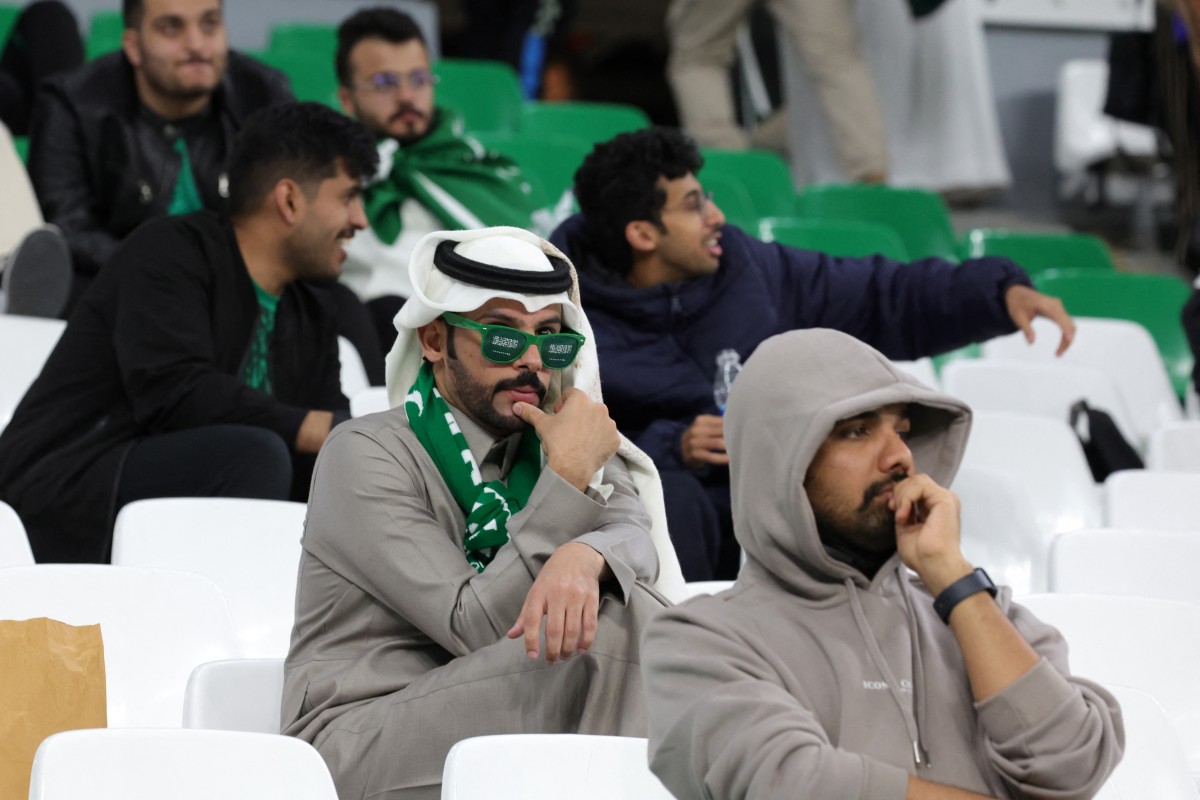It has been another AFC Asian Cup disappointment for Saudi Arabia.
It has now been 17 long years since the Green Falcons last made it to the quarterfinals of the tournament, and by the time the Kingdom hosts the next edition in 2027, it will be two decades.
Roberto Mancini, a European Championship- and English Premier League-winning coach, was brought in with high expectations, but could not inspire a transformation in Asian Cup fortunes.
It means that the joy and positivity that followed the FIFA 2022 World Cup victory over eventual champions Argentina has now firmly dissipated, and there is some serious soul-searching going on in Saudi Arabia football.
Fortunately for fans of the Green Falcons, there are still plenty of reasons for optimism.

Saudi Arabia supporters react at the end of the Qatar 2023 AFC Asian Cup football match between Saudi Arabia and South Korea at Education City Stadium in al-Rayyan, west of Doha, on January 30, 2024. (AFP)
Despite the disappointment of his side’s Asian Cup exit, Mancini was responsible for integrating a number of promising players into the senior side in recent months.
The most headline-grabbing of those was record-breaking Al-Ittihad striker Talal Haji, who at 16 years old became Saudi Arabia’s youngest-ever player last November. And then, against South Korea, made history as the Asian Cup’s youngest debutant.
Beyond Haji, a quartet of 2022 AFC Asian Under-23 Cup winners also played in Qatar, including last-16 goalscorer Abdullah Radif, defender Hassan Tambakti, right wing-back Saud Abdulhamid and Al-Ahli striker Firas Al-Buraikan.
This progression from the youth ranks to the senior set-up is something Saudi Arabia is hoping to see more regularly in the coming years. At the heart of this is a pioneering initiative by the Saudi Football Federation — the Future Falcons program.
Designed to select and train the Kingdom’s most exciting prospects and ready them for potential careers in European football, Future Falcons is led by former Kuwait national team coach and Croatian player Romeo Jozak.
“We bring together Saudi players between the ages of 18 to 21 to train year-round in a camp in Spain,” Jozak, the program’s technical director, told Arab News. “From these guys, we choose the best ones that we think have the quality and personality to realistically sign for European clubs.
“With Saudi Arabia now hosting the World Cup in 10 years, Future Falcons has become even more important.”
Future Falcons is run like a professional football club, with its players training regularly and competing against the academies of other European clubs including the likes of Real Madrid and Sporting. The youngsters’ performances and personalities are evaluated and those who are good enough are connected with European clubs.
“I often use the example of basketball in Croatia,” Jozak said. “We have had a good national team for many years because we have had players in the NBA — playing at the highest level. When we haven’t had NBA players, we haven’t done well.
“Europe is the center of the world in football terms and so we need Saudi Arabian talent to be playing in Europe. This is our objective. In 10 years’ time when the World Cup is in Saudi Arabia, the players we have now will be at their peak and we need them to be competitive.”
There have already been successful player placements, with Rayan Fallatah and Samer Al-Mohaimeed signing for Greek second-tier side Diagoras. In addition, Mohammed Al-Rashdi is moving to Slavia Prague, Saleh Alrakaf and Faisal Alharthi are playing in Croatia with Jadran Porec, and Abdulmalik Al-Jaber is moving to Bosnian Premier League side Zeljeznicar.
“It is not only about the football quality,” said Jozak. “It is about being able to adapt into different team situations, the understanding of — and ability to cope — with pressure; mentality is vital because European football can be cruel, it can be brutal. There is huge competition with players from Africa, from South America — it is survival of the fittest in football.
“That is why focus has to not only be on the big leagues in Europe; Mohamed Salah is one of the world’s best players and he made his breakthrough in Switzerland. You can still have an amazing career without starting in the big leagues. There are intermediate steps you can take.
“But ultimately, European football is an objective filter and if these Saudi players survive it, then they will make it happen for themselves. That is the goal of myself and my staff here at Future Falcons.”
Jozak has an impressive pedigree when it comes to advancing the careers of young talents, having coached Luka Modric, Mario Mandzukic and Vedran Corluka — players who formed the core of Croatia’s historic run to the 2018 FIFA World Cup final.
The emergence of Croatia’s golden generation was, according to Jozak, the result of extensive work behind the scenes from scouts, technical staff and coaches, over the course of many years.
With Saudi Arabia hosting the 2034 World Cup, the need for the Future Falcons project to be successful has become more pressing, but Jozak insists that it must still be viewed through a long-term lens.
“It is going to be challenging but if I had to start from scratch with either Croatia or Saudi Arabia, it would be Saudi Arabia every time because of the numbers,” Jozak said. “There is a much bigger pool of talented players — the challenge is of course finding them.
“In Croatia, we basically knew every good young player in the country, they couldn’t hide from us. In Saudi Arabia this is not possible yet because it is a huge country and detecting the talent is a complex job.
“Future Falcons is definitely a long-term project but things are changing fast and we hope these foundations will help Saudi football reach new levels in the future.”


